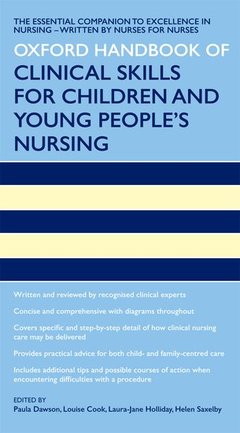Description
Oxford Handbook of Clinical Skills for Children's and Young People's Nursing
Oxford Handbooks in Nursing Series
Coordinators: Dawson Paula, Cook Louise, Holliday Laura-Jane, Reddy Helen
Language: English
Subject for Oxford Handbook of Clinical Skills for Children's and...:
Publication date: 07-2012
648 p. · 10.3x18.1 cm · Paperback
648 p. · 10.3x18.1 cm · Paperback
Description
/li>Contents
/li>Biography
/li>
Children's nurses are faced with unique challenges when undertaking clinical skills, adapting their knowledge and practice for the physical and developmental age of their patients. The Oxford Handbook of Clinical Skills for Children's and Young People's Nursing is a practical guide to both the most basic and the increasingly complex elements of caring for the health needs of children and young people. Focusing on the key principles underpinning all elements of care, it provides a solid, evidence-based framework which practitioners can use to develop their clinical knowledge, skills, and attitudes. It systematically covers the body systems and the clinical skills relating to them, and includes additional tips and suggested courses of action when encountering difficulties with a procedure, with practical advice from current practitioners. Written by experienced children's nurses working either within clinical paediatric settings or as educators in the field, this handbook is an essential, quick, and reliable practice reference tool for any clinical setting.
1. The principles of patient assessment. 2. The principles applying to clinical skills and procedures. 3. Communication. 4. Assessing the child and young person. 5. Personal hygiene and comfort. 6. Play. 7. Infection control. 8. Drug administration. 9. Intravenous care. 10. Care of the perioperative patient. 11. Emergency and high dependency. 12. Respiratory system. 13. Cardiovascular system. 14. Neurological system. 15. Gastrointestinal system. 16. Genitourinary system. 17. Musculoskeletal system. 18. Wound care. 19. Ear, nose, and throat system. 20. Ophthalmology. 21. Dermatology. 22. Endocrinology. 23. Haematology and immune system.
Paula Dawson trained as a general nurse at the Nightingale School, St. Thomas' Hospital in London, and as a children's nurse at the Nottingham School of Nursing. She has held a range of clinical, managerial, practice development, and educational roles both in the UK and overseas in a career spanning over 25 years. She is committed to the pursuit of excellent, person-centred, and evidence-based care with a focus on the unique and essential role of the nurse in the multi-disciplinary team. Louise Cook attained her first degree in Psychology and Sociology (BA Honours) from the University of Leeds before going on to train as a children's nurse at the University of Nottingham. She worked for seven years within acute hospital trusts in Nottingham before joining the University of Nottingham as a full time lecturer in Child Health. She lectures on a wide range of topics including her specialist interest areas of cleft and wound care and is heavily involved in the teaching of evidence-based clinical skills to undergraduate nursing students. Laura-Jane Holliday trained as a Children's Nurse, obtaining an Undergraduate Masters in Nursing Science Degree at the University of Nottingham. Her previous clinical experience includes children's medical, neuro-medicine, and cardiology and she continues to work on a children's medical and respiratory ward. She is a Practitioner Health Lecturer in children's nursing at the University of Nottingham and a preceptorship development nurse, working within the practice development team for the Children's Hospital, Nottingham. Her interests encompass reducing the theory-practice gap, progressing and teaching of clinical skills, and practice and staff development. Helen Reddy qualified as a children's nurse in 1998 from Demontford University. She has benefited greatly from her experiences at Leicester Royal Infirmary NHS Trust, Nottingham University Hospitals NHS Trust, and Great Ormond Street Hospital NHS Trust, working in both general and int
© 2024 LAVOISIER S.A.S.
These books may interest you

Paediatric Handbook 48.15 €


